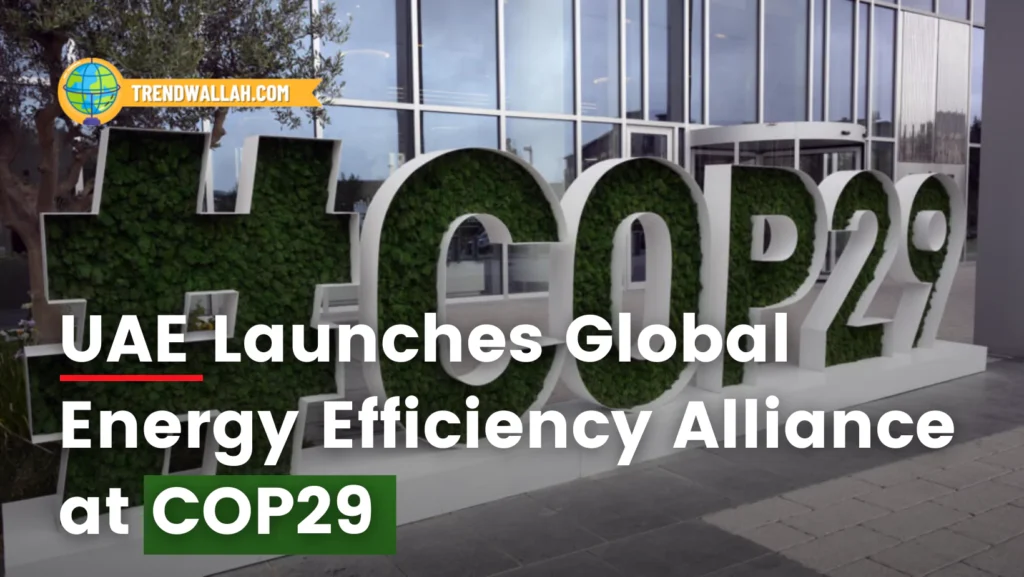
The United Arab Emirates (UAE) has announced the creation of the Global Energy Efficiency Alliance during the COP29 summit in Baku, Azerbaijan. This ambitious initiative aims to double global energy efficiency rates by 2030 while reducing carbon emissions and conserving natural resources. The alliance reflects the UAE’s leadership in global sustainability and builds on its commitments from COP28.
Key Objectives of the Global Energy Efficiency Alliance
The alliance has been designed with clear goals to drive sustainability and energy efficiency worldwide:
- Doubling Global Energy Efficiency Rates: The alliance aims to accelerate annual efficiency improvements globally by 2030.
- Reducing Carbon Emissions: By improving efficiency, the alliance seeks to significantly cut global greenhouse gas emissions.
- Minimizing Resource Consumption: A focus on sustainable practices to preserve natural resources.
- Encouraging Public-Private Partnerships: Collaboration between governments and private entities to achieve these objectives.
| Objective | Description |
| Doubling Energy Efficiency Rates | Achieving annual global energy efficiency growth by 2030. |
| Cutting Carbon Emissions | Reducing greenhouse gases through enhanced efficiency. |
| Resource Conservation | Promoting sustainable use of natural resources. |
| Collaboration | Engaging public and private stakeholders globally. |
UAE’s Leadership Role in Energy Efficiency
The UAE has taken a leading role in establishing and promoting the alliance:
- Knowledge Sharing: The UAE will transfer expertise and best practices to other nations.
- Public-Private Collaboration: Partnerships between the government and private entities are a cornerstone of the initiative.
- Policy Development: Driving innovation through supportive policies and advanced technologies.
- Leadership Commitment: Senior official Sharif Al Olama emphasized the UAE’s dedication to global sustainability and urged others to join this effort.
Special Focus on African Nations
A unique aspect of the alliance is its focus on supporting African countries:
- Financial Solutions: Tailored funding mechanisms to support energy efficiency projects in Africa.
- Technology Sharing: Providing access to cutting-edge technologies.
- Capacity Building: Training programs to empower local communities and governments.
Importance of Energy Efficiency for Sustainable Development
Improving energy efficiency has far-reaching benefits, including:
- Environmental Impact: Reduces carbon emissions and slows climate change.
- Economic Advantages: Saves costs and promotes investment in innovative technologies.
- Resource Conservation: Ensures sustainable use of limited natural resources.
Call for Global Participation
Sharif Al Olama, Undersecretary for Energy and Petroleum Affairs in the UAE, has called on governments, organizations, and private-sector leaders to join the alliance. He emphasized that global collaboration is essential to achieve the ambitious goals of the alliance and create a sustainable energy future.
UAE Global Energy Efficiency Alliance at COP29 Summary
- UAE launched the Global Energy Efficiency Alliance during COP29 in Azerbaijan.
- Goals include doubling energy efficiency rates by 2030, reducing carbon emissions, and conserving natural resources.
- UAE to share knowledge and collaborate globally, especially with African nations.
- Public-private partnerships and financial support will play a crucial role.
- Sharif Al Olama urged global participation for collective climate action.
Also Read Latest Current Affairs 2024
Victoria Kjaer Theilvig Wins Miss Universe 2024 in Mexico
| AAP’s Mahesh Kumar Khichi Elected as Delhi Mayor | Tata Electronics Acquires 60% stake in Pegatron’s iPhone Plant |
FAQs About the Global Energy Efficiency Alliance
The alliance is a UAE-led initiative announced at COP29 to double global energy efficiency rates by 2030 and reduce carbon emissions.
The alliance promotes sustainable development, reduces carbon emissions, and encourages international collaboration in energy efficiency practices.
The UAE leads the initiative by sharing expertise, fostering global partnerships, and supporting policy and technological innovation.
The alliance provides African nations with tailored financing, advanced technologies, and knowledge-sharing initiatives to enhance energy efficiency.
Its primary goals are doubling energy efficiency rates, reducing emissions, and encouraging resource conservation.
Organizations can join through partnerships, knowledge-sharing initiatives, and implementing sustainable practices.
Energy efficiency reduces greenhouse gas emissions, conserves resources, and drives technological and economic benefits.

